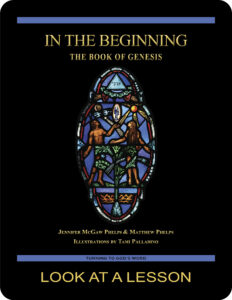inheritance
 In the Gospel According to Mark 10:17 (NABRE), Jesus talks with a man who wants to know what he must do to inherit eternal life. As the discussion progresses and shifts to the subject of material possessions, it’s easy to read over something extremely interesting in the initial question.
In the Gospel According to Mark 10:17 (NABRE), Jesus talks with a man who wants to know what he must do to inherit eternal life. As the discussion progresses and shifts to the subject of material possessions, it’s easy to read over something extremely interesting in the initial question.
The word used by the man to describe gaining eternal life, κληρονομέω (kleronomeo), literally means “to receive by lot” and has related meanings of “receiving a portion” or even “inherit,” as it’s typically translated in this passage. At first, this seems like an extremely strange way to talk about receiving eternal life.
In the Old Testament, the thirteenth through eighteenth chapters of the Book of Joshua (NABRE) describe Joshua dividing the Promised Land among the descendants of Jacob. Each family ultimately received a portion or inheritance. This was to be their eternal portion and was to be passed down in their family.
In the New Testament, the question Jesus is asked suggests that the man asking is looking for a similar portion in the true Promised Land—eternal life. He seems to think Jesus has some say in distributing such portions, just as Jesus’ namesake Joshua once parceled out the land of Canaan.
How do you think we come to have eternal life? Who do you think decides?
you also may like our study of the book of Genesis
 The first seven lessons of In the Beginning: The Book of Genesis, a 28-lesson Catholic Bible study with an imprimatur, provide an in-depth look at the very earliest biblical history—including the two accounts of Creation, events surrounding the Fall of Adam and Eve, the relationship between Cain and Abel, and the baptismal foreshadowing present in the account of Noah and the Flood. Remaining lessons look at lives of the patriarchs Abraham, Isaac, Jacob, and Joseph. Click on the book’s cover to view a sample lesson.
The first seven lessons of In the Beginning: The Book of Genesis, a 28-lesson Catholic Bible study with an imprimatur, provide an in-depth look at the very earliest biblical history—including the two accounts of Creation, events surrounding the Fall of Adam and Eve, the relationship between Cain and Abel, and the baptismal foreshadowing present in the account of Noah and the Flood. Remaining lessons look at lives of the patriarchs Abraham, Isaac, Jacob, and Joseph. Click on the book’s cover to view a sample lesson.
 Click on the picture of the statue of Moses with horns (above) to learn more about Lost in Translation. A new entry is archived each Monday. Contact us to receive Lost in Translation by email every week. You may use any of the contact links on our website to ask Matthew a question.
Click on the picture of the statue of Moses with horns (above) to learn more about Lost in Translation. A new entry is archived each Monday. Contact us to receive Lost in Translation by email every week. You may use any of the contact links on our website to ask Matthew a question.
